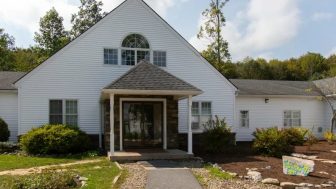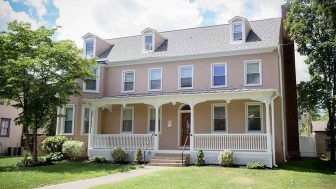Geisinger Marworth
12 Lily Lake Road
Waverly, PA 18414
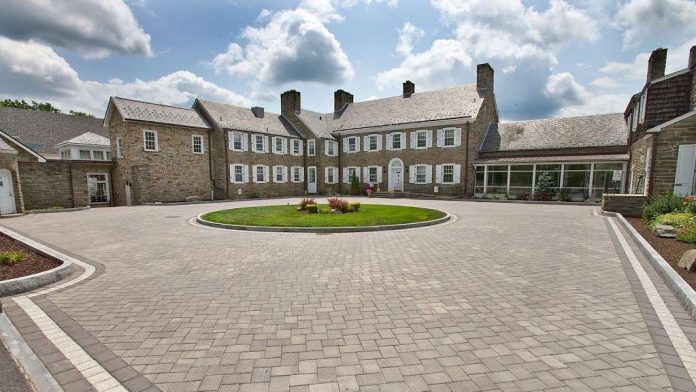
About Geisinger Marworth
Located in Waverly, Pennsylvania, Geisinger Marworth is a drug and alcohol addiction treatment center for adults with substance use disorders. Offering inpatient drug and alcohol rehab, detox, counseling, and outpatient addiction treatment.
Geisinger Marworth is located on a sprawling 27 acre private estate that used to be a former governor’s private home. Having supported over 40,000 individuals to overcome addiction, Geisinger Marworth has the expertise and addiction medicine specialists to support alcohol, drug, and opioid use disorders. Using a range of evidence based treatments, the treatment team offers medication assisted treatment, motivational interviewing, behavioral modifications using cognitive behavioral therapy, and medication management using medication assisted treatment (MAT). Patients also benefit from family education and counseling, access to an addiction psychiatrist, extended care, and experiential therapies. Amenities include landscaped gardens, nutrition services, outdoor lounge areas, recreational activities, access to psychiatrists and licensed therapists, acupuncture, and trauma informed care.
Licensed by the Pennsylvania Department of Health Office of Drug and Alcohol Programs, and accredited by the Joint Commission, the National Association of Addiction Treatment Providers, and the Commission on Accreditation of Rehabilitation Facilities (CARF), reflecting high quality healthcare. Geisinger Marworth accepts Medicare, Medicaid, commercial insurance, self pay, and financing. Financial assistance is also available.
Amenities
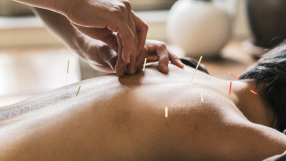
Acupuncture Room
Acupuncture is one of the most popular luxurious and alternative therapies offered by rehabs. An acupuncture r...oom provides benefits like pain reduction, improved sleep, a healthy immune system, and a decrease in anxiety.
Art Therapy
Art and music are mediums that connect with our feelings, making them a great recovery tool during addiction t...reatment. Studies show that combining art/music and drug rehab can have a greater therapeutic impact than drug rehab alone, as you’re able to access parts of your brain and body that you may not have access to during traditional talk therapy. Benefits of art/music therapy include lowering stress and anxiety, promoting healthy neurochemicals, and providing stress relief.
Gym
When paired with cognitive-behavioral therapy, exercise can be an effective tool for overcoming addiction. Dru...g rehabs with a gym offer clients healthy ways to increase energy levels, balance the body’s stress hormone levels, and aid in the brain’s healing process.
Adventure Therapy
Hiking is a great way to relieve stress, get perspective, navigate challenges, connect with nature, and improv...e your health - all essential components of sustaining long-term recovery. Studies also show that the body releases endorphins during physical activities like hiking. These endorphins improve mood and act as a natural pain reliever.
Music Room
Music can be extremely therapeutic, serving as a valuable healing tool and an integrative feature of a holisti...c treatment plan. A music room offers a large number of outlets, including singing, playing musical instruments, and listening to music.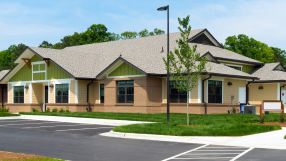
Private Rehab
Private drug rehab provides a comfortable, secure environment that allows you to focus on doing the work to ge...t your life back on track. Benefits include a higher staff-to-client ratio, increased one-on-one time with therapists and healthcare providers, private rooms for clients, and customized forms of therapy.
Rec Room & Activities
Recreational therapy uniquely combines therapeutic interventions with an activity, like horse-riding, hiking, ...wilderness therapy, basketball, tennis, or a full workout. Benefits of recreational therapy include providing a healthy way to work through the emotions of recovery, learning to build and maintain relationships, improving communication skills, and building self-esteem.
Wilderness Setting
Wilderness rehab programs offer all the benefits of a traditional drug rehab, but with the added benefits of o...utdoor adventure. Venture out into the forest to learn new skills, explore the beauty of nature, and relieve stress. Engaging in wilderness activities is a great way to gain self-discovery and release negative emotions.Addiction Treatment Programs
Adult Program
The Keystone State offers many resources for those struggling with substance use disorders. Each adult program in Pennsylvania provides individualized care, to meet people where they are and help them take the next step on their recovery journey.Alcoholism
Alcohol rehab in Pennsylvania uses various treatment techniques to teach you how to change your lifestyle, living environment, and social connections. These changes help you control urges to drink and learn how to prevent relapse.Cognitive Behavioral Therapy (CBT)
Cognitive behavioral therapy in Pennsylvania helps participants identify inaccurate thinking and learned patterns of negative behavior and how to change them. It gives participants the skills to relieve their symptoms without turning to substances.LGBTQ Friendly Rehab
LGBTQ-friendly rehab in Pennsylvania offers demographic-specific addiction treatment programs to help create positive recovery outcomes designed to overcome stigma and discrimination by creating an environment where clients feel supported and encouraged.Men's Rehab
Men’s rehab in Pennsylvania can help men receive support from other men who understand their challenges. This provides a sense of camaraderie that relieves feelings of isolation.Opioid Treatment
Opioid rehab in Pennsylvania often includes medication assisted treatment, which helps alleviate withdrawal. This treatment is combined with other therapies that give you skills to navigate addiction and achieve long-term recovery.Women's Rehab
Women’s rehab in Pennsylvania helps females struggling with substance use disorders build the skills necessary to maintain sobriety. Treatment is designed to help women stay on track for long-term recovery.Teen & Adolescent Program
A young adult program in Pennsylvania provides a comfortable, age-appropriate environment for treatment. These programs offer life skills education, individualized treatment, family therapy, and aftercare.Levels of Care
Detox & MAT
Experience safe detox in Pennsylvania as your initial step toward recovery. During this process, you’ll rece...ive 24/7 care while your body is cleansed of all addictive substances. Treatment may include medication to alleviate withdrawal symptoms.Inpatient Rehab
When first starting drug rehab in Pennsylvania, many individuals begin with inpatient rehab. This involves sta...ying at the facility 24/7 and receiving a variety of treatment methods that typically include group and individual counseling.Outpatient Rehab
While undergoing outpatient treatment in Pennsylvania, you’ll work through challenges such as cravings, soci...al skills, and relapse prevention as you meet with a recovery expert and attend 12-step meetings. This treatment may last a few weeks or several months, depending on your recovery needs.Aftercare & Alumni Program
Following rehab, you can receive much-needed ongoing support through aftercare rehab in Pennsylvania. Services... may include financial planning, career guidance, legal advice, and other practical supports, as well as counseling and 12-step groups. Taking advantage of these resources greatly reduces the chance of relapse.Dual Diagnosis & Mental Health
Mental illness and substance abuse are so integrated that they must be treated together. Ignoring one and trea...ting the other doesn’t work. Dual diagnosis treatment in Pennsylvania effectively addresses both mental health and substance abuse disorders, for the best outcomes.Accreditations

NAATP

SAMHSA

Joint Commission

State License #:
GSOZ6601Insurance
 Medicaid Accepted
Medicaid Accepted
If need help paying for alcohol and drug rehab in Pennsylvania, you may be eligible for Medicaid. Coverage thr...ough Medicaid may vary, but it can assist with the cost of alcohol and drug rehab, including detox, inpatient rehab, and more.
 Medicare Accepted
Medicare Accepted
if you're eligible for Medicare, you may be able to get help to pay for the cost of alcohol and drug rehab in ...Pennsylvania. The amount of coverage will depend on many things, including whether you are seeking inpatient or outpatient treatment for substance abuse.
 Private Insurance
Private Insurance
Your private insurance may cover the cost of alcohol and drug rehab in Pennsylvania. The amount covered may de...pend on your policy and whether the treatment center is in-network or out-of-network. You may be left with some costs like a co-payment, or co-insurance. Check with your insurer for more information.
 Self-Pay Options
Self-Pay Options
You have the choice to pay for your alcohol and drug rehab in Pennsylvania out-of-pocket, also called as self-...pay or private pay. This way, there are no restrictions placed on your access to treatment, courtesy of insurance companies. Payment methods include checks, personal loans, medical loans, credit cards, and many others.
 Sliding Scale Payment
Sliding Scale Payment
If you can't pay the full amount for alcohol and drug rehab in Pennsylvania, a sliding scale payment plan may ...be an option for you. This way, you can access all levels of care, including detox, inpatient rehab, and more. To qualify for this treatment discount, you must complete an application and provide supporting financial documentation.Contact Geisinger Marworth

